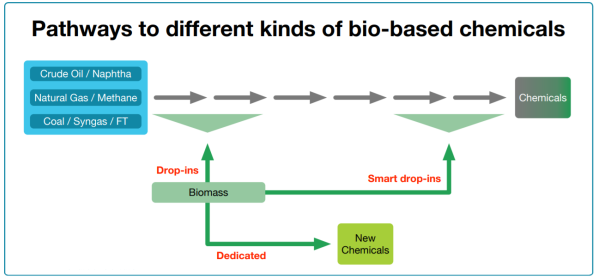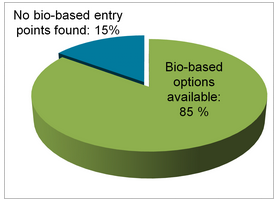Dear Reader,
Welcome to the fifth RoadToBio newsletter. Our roadmap for increasing the bio-based portfolio and improving the sustainability of the European chemical industry is already shaping up.
In this newsletter we present a short summary of our first webinar “The best of two worlds – making chemistry more bio-based”, which was held on 7 February 2018. After a short introduction about the necessity of the transition from a fossil based to a more bio-based chemical industry, a classification system for bio-based chemicals with regard to their entry point into existing chemical value chains was presented. The third and final part showed the results of the initial RoadToBio study which aimed to identify and to discuss specific “Bio-based opportunities for the chemical industry”.
With best regards and a very happy and bright Easter,
Lea König
DECHEMA e.V.
On behalf of RoadToBio consortium
Please consider – if not done already – to subscribe to the RoadToBio newsletter.
The best of two worlds – making chemistry more bio-based
The RoadToBio Consortium presented the latest results of the project in a one-hour webinar on February 7. This webinar was a special experience for us, it created the link between newly developed definitions and the unique goals we aimed in RoadToBio. Listeners from Singapore, New Zealand and different parts of Europe logged in to listen to the one-hour online lecture. In addition to a general introduction which answered the questions “why it makes sense to switch to bio-based chemistry”, the definitions of drop-ins, smart drop-ins and dedicated chemicals were explained in more detail. On this basis bio-based opportunities for the chemical industry were presented, which we identified within the framework of the project.
”Why we are trying to make chemicals more bio-based?”
In 2005 the European Commission published a framework programme to define the main goals and an action plan to support the European bioeconomy for the first time. While originally the substitution of limited and expensive fossil raw materials was a major driver for the transformation, today sustainability considerations are at the core of the efforts for a more bio-based economy.
The latest catchphrase heard in this context is “biologisation”, which can mean two different things: Using biotechnological processes and/or using biomass as a resource. Both can, but don’t necessarily have to, go hand in hand.

The chemical industry has long started to use the best of both worlds, combining chemical and biotechnological process steps as needed.
Categories of bio-based chemicals used in the chemical industry
For a higher clarity, the chemical industry used different terms to classify bio-based chemical products. This classification is non-scientific but each of these classes is useful to individualize market uptake strategies of bio-based chemicals. For this reason we use a new category of classification of bio-based products. In addition to drop-ins and dedicated chemicals, the group of smart drop-ins was introduced. The different classifications were explained in more detail during the webinar and applied directly in the following.

Bio-based smart drop-ins are a subset of drop-ins, which have two or more of the following characteristics: high biomass utilisation efficiency, low energy use in their production, short or less complex production pathway, and/or fewer toxic chemicals used in their production and enter existing fossil chemical value chain at a later stage. As a consequence, smart drop-ins will usually be commodities of smaller volume compared to normal drop-ins.
To learn more about the new concept of classifications of bio-based chemicals you can listen to the webinar or read nova’s full paper on bio-based drop-ins, smart drop-ins and dedicated bio-based chemicals here.
Bio-based opportunities for the chemical industry
 In one of the first RoadToBio studies more than 500 petrochemical value chains in nine different product groups were analysed, which showed more than 1,000 entry points for bio-based chemicals. For 85 % of the existing petrochemicals, at least one bio-based route was found that is available at either demonstration or commercial scale.
In one of the first RoadToBio studies more than 500 petrochemical value chains in nine different product groups were analysed, which showed more than 1,000 entry points for bio-based chemicals. For 85 % of the existing petrochemicals, at least one bio-based route was found that is available at either demonstration or commercial scale.
This study provides the knowledge base for the subsequent activities in the project, notably an assessment of the barriers as well as the most promising opportunities, and nine specific business case studies, which will together inform the roadmap for the chemical industry. More specifically, the next step will be to rank the identified matching chemicals with regard to market volumes, implementation feasibility and growth potential.
Want to take a closer look? Listen to the webinar or for more detailed information download the full report here.
Join the network
We would like to invite you to join us on the journey to a more bio-based chemical industry. The roadmap should contain clear, realistic goals. Your knowledge and experience is necessary to create a market relevant roadmap with a high impact. Therefore, we will conduct workshops and webinars to involve you as stakeholder.
Your opinion is of utmost importance to us. Through your participation, you get the opportunity to help shape the development process and to find your opinion later in the roadmap.
How?
Visit the project website: https://www.roadtobio.eu
Subscribe to the newsletter: https://www.roadtobio.eu/newsletter
Contact us at lea.koenig@dechema.de
Upcoming event
Whether you are an industrialist, a NGO, a government policy maker or another stakeholder, your engagement is important to us. With your knowledge and contribution, it is possible to create a strong roadmap with a high impact and containing clear, realistic goals.
Join us on the journey to a more bio-based chemical industry and participate in our stakeholder workshops and webinars. Our next stakeholder workshop is scheduled to be held on 19 June 2018 in Brussels.
Through your participation in our stakeholder dialogue process you get the opportunity to help shape the development process and help steer the content of the roadmap.
Make a reservation for this date and contact us at lea.koenig@dechema.de
What you can expect from the next newsletter
Previously in the project identified opportunities to introduce bio-based chemicals into existing fossil-based process chains are shown and the definitions presented here are applied directly to practical examples. Do not miss the next newsletter.
Introduction of the RoadToBio Team
The consortium of this two-year project, which started in May 2017, consists of four members:
- DECHEMA Gesellschaft für Chemische Technik und Biotechnologie e.V.,
- BTG Biomass Technology Group BV,
- E4tech (UK) Ltd.,
- nova-Institut für politische und ökologische Innovation GmbH.
They bring in complementary expertise in relevant fields of the bioeconomy and chemical industry, covering in depth all aspects that need to be included in the roadmap.
This project has received funding from the Bio-Based Industries Joint Undertaking under the European Union’s Horizon 2020 research and innovation programme under grant agreement No. 745623.
Source
RoadToBio Newsletter March 2018, 2018-03.
Supplier
Bio-based Industries (BBI) Joint Undertaking
Bio-based Industries Consortium (BIC)
Biomass Technology Group BV (BTG)
DECHEMA Gesellschaft für Chemische Technik und Biotechnologie e.V.
European Commission
Share
Renewable Carbon News – Daily Newsletter
Subscribe to our daily email newsletter – the world's leading newsletter on renewable materials and chemicals









